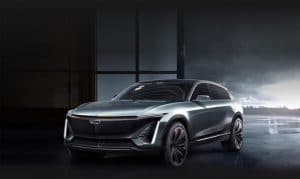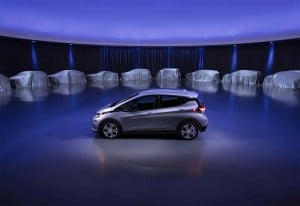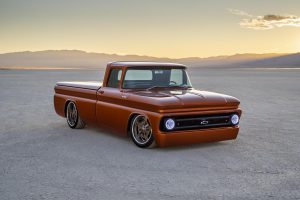
Rick Spina, GM’s head of autonomous and electric vehicle commercialization, believes battery cars will gain market traction faster than many have been predicting.
General Motors is “on track” to meet its goal of having 20 battery-electric vehicles in production by 2023, a senior executive said, despite the fact that it hasn’t introduced a new BEV since launching the Chevrolet Bolt EV three years ago.
Expect to see a flood of new offerings that will follow the debut of Cadillac’s first all-electric model a little more than a year from now, hinted Rick Spina, GM’s vice president of electric and autonomous vehicle programs, in a conversation with TheDetroitBureau.com.
Spina also believes that BEVs could start to gain momentum more quickly than many industry observers have forecast – though he also cautioned that there are still some significant obstacles that need to be overcome before they become a true, mainstream alternative to gas- and diesel-powered vehicles.
(Cybertruck’s design won’t be only issue for Tesla, GM’s E-truck coming out at same time)
“A fairly large chunk of our products in the next three to seven years will be electric vehicles,” Spina said during a telephone interview, adding that “GM is traditionally a full-line company, so we’re going to compete everywhere,” not just in high-line segments.

Cadillac will be the next GM brand to introduce a long-range BEV, its electric SUV to follow about a year from now.
It’s been a decade since Detroit’s largest automaker introduced its first mainstream, plug-based vehicle, the Chevrolet Volt plug-in hybrid. It has since offered an assortment of different hybrids and plug-ins but, moving forward, they will play a diminishing role in GM’s product strategy, said Spina.
“We’re very heavily biased towards EVs,” he noted, adding that “we believe doing dedicated (single-purpose) platforms will get us more compelling products than platforms that have to be flexible” enough to be used for a variety of different powertrain technologies, such as gas, diesel, hybrid, plug-ins and BEVs.
That puts GM at odds with some manufacturers, such as crosstown rival Ford, as well as industry giant Toyota, both of which are betting that it makes more sense to offer customers a wide range of alternatives until it becomes clear which way the market is heading. Even BMW, which was the first to roll out a dedicated, all-electric sub-brand, has shifted in that direction.
But GM’s strategy puts it more in sync with another major competitor, Volkswagen AG. The German automaker has itself laid out plans to have nearly 50 all-electric models in production by the middle of the coming decade through its various brands. That began with the rollout of the Audi e-tron earlier this year, with offerings from the VW and Porsche brands quickly following in 2020.

The Chevrolet Bolt EV will be one of about 20 GM battery-cars on the market by 2023, the automaker says.
A key advantage of using dedicated platforms is that this helps hold down costs, Spina and other industry executives have noted. And cost is one of the key obstacles to widespread acceptance of battery cars.
The good news, the GM EV chief noted, is that costs are beginning to come down, especially for batteries. Spina’s boss, General Motors President Mark Reuss, has said that the automaker is now spending less than $150 a kilowatt-hour, or barely 15% of what it cost when the original Chevy Volt was launched. And industry analysts, including the Boston Consulting Group and Navigant Research, are predicting the number will drop to under $100, and possibly as low as $70 per kWh, during the next three to five years.
(Ford cries foul on Tesla Cybertruck tug-of-war with F-150)
“That is definitely reasonable in the 2022-2023 timeframe,” said Spina, though it is unclear whether that will reflect further improvements in today’s lithium-ion batteries or the introduction of next-generation technology, such as solid-state batteries.
Either way, he added, “the holy grail of EVs is finding more creative ways to store energy in batteries,” something that will result not only in lower costs but also greater range and reduced charging times.
That’s another critical challenge, said Spina, though, with increasing availability of the latest-generation public quick chargers, charging should also become less and less of a concern.

Chevrolet’s E-10 Concept hints at what the bowtie brand might be working up for the future of performance in an electrified world.
The drawbacks of electric vehicles are starting to be outweighed by their advantages, he stressed. Since most EV owners charge at home or the office, they actually start out most mornings with the equivalent of a full tank.
Then there’s performance. Though it comes nowhere close to matching the performance of a Tesla Model 3 with Ludicrous Mode, the Bolt is one of the faster vehicles in the mainstream compact segment. And it’s far from unique. The Hyundai Kona EV is quicker than the gas-powered version of the EV, and the new Toyota RAV4 Prime is set to become both the fastest and most powerful version of that popular SUV.
Putting the emphasis on performance will be essential in selling future BEVs, Spina forecast, especially those in luxury segments like the upcoming Cadillac SUV. With their instant torque, that will prove to be a potentially game-changing advantage. The good news is that it’s far less expensive to go from a base electric motor to one delivering serious performance, said Spina, “even at the bottom of the price ladder,” hinting that this approach will cover the gamut of future GM products.
If the Detroit automaker does make good on its promise to deliver 20 BEVs it will have one of the largest portfolios on the market. But, as they face increasingly stringent government emissions and mileage regulations, other automakers are ramping up their electrification efforts, as well. And that raises concerns about whether the market will be ready to absorb all those upcoming products.
For its part, GM isn’t releasing its own market forecast, though Spina pointed to estimates from IHS Markit which anticipates 30% of the new vehicles sold in the U.S. will be BEVs by 2030. While some suggest that number is too optimistic, others think the electric vehicle market could reach an inflection point by mid-decade that will see consumer acceptance take off much more rapidly – especially if the key issues of price, range and charging are addressed.
(GM CEO Barra confirms plans for electric pickup)
Spina said he’s personally optimistic. GM’s own market research, he said, has found those who already own an EV to be highly positive about their vehicles and, “As you know, word of mouth is a very important thing when you’re selling any consumer product.” As more people buy battery-cars, he predicted, that positive word of mouth will spread and, “there won’t be enough downsides to keep people away from EVs.”
